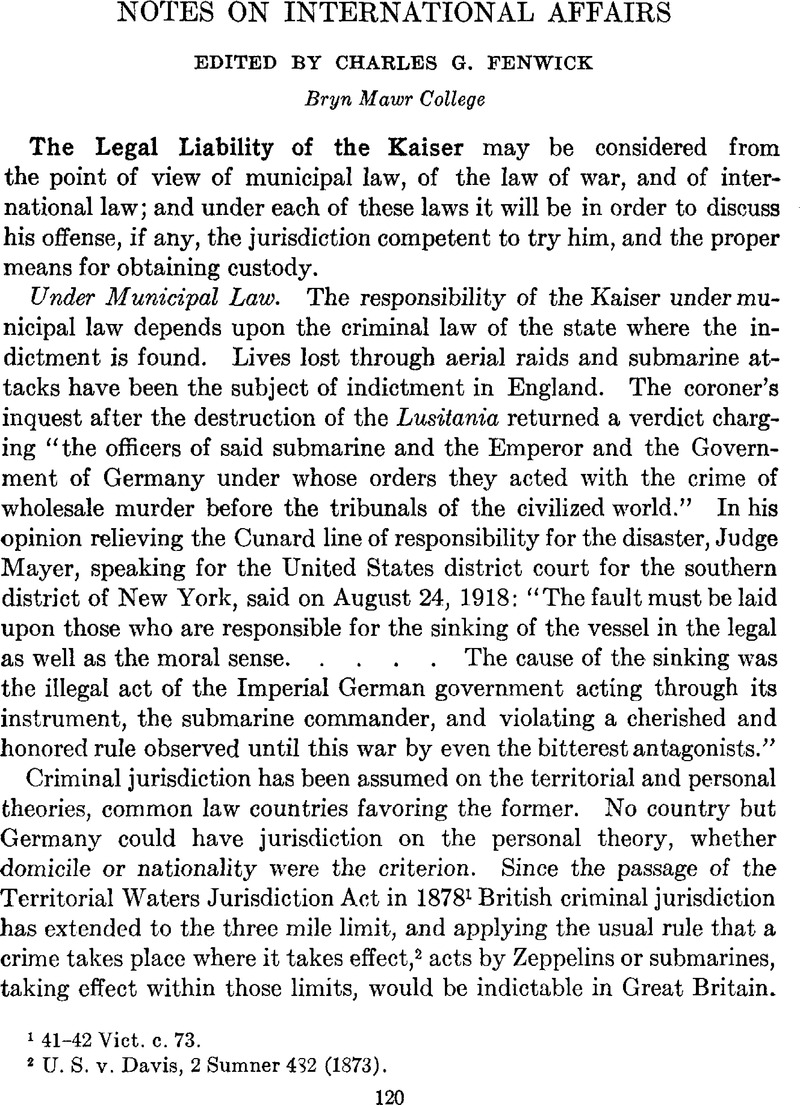Published online by Cambridge University Press: 02 September 2013

1 41–42 Vict. c. 73.
2 U. S. v. Davis, 2 Simmer 482 (1873).
3 L. R. 2 Ex. D. 63 (1876).
4 Mighell v. Sultan of Johore, 1 Q. B. 149 (1894); DeHaber v. Queen of Portugal, 17 Q. B. 196 (1851).
5 2 H. of L. Cases, 1.
6 Hatch v. Baez, 7 Hun. 596; Underhill v. Hernandez, 26 U. S. App. 573 (1895).
7 27 Eliz. c. 1 (1585).
8 Willis-Bund, , State Trials (1879), I, 264, 269.Google Scholar
9 11th ed., V, 911.
10 Grotius, I, 4, 9; Vattel, IV, 7, 108; Satow, , Diplomatic Practice, I, 7.Google Scholar
11 7 Federal Cases 64.
12 Napoleon, the Last Phase, p. 59.
13 7 Federal Cases 66. See also Underbill v. Hernandez, supra note 6.
14 De Iure Belli ac Pacis, II, 21, 4.
15 Judges, c. 15.
16 Plutarch, Lucullus.
17 Plutarch, Cato the Younger.
18 Grotius, op. cit., citing Marianna, 20: 1.
19 In re Ezeta, 62 Fed. Rep. 972; Ornelas v. Ruiz, 161 U. S. 502. Treaties of Netherlands with France, 1844, art. 3; with Great Britain, 1874, art. 6; with United States, 1887, art. 3.
20 Moore, , Digest, IV, 250Google Scholar; For. Rel. (1894), p. 730.
21 Grotius, op. cit. III, 11, 7.
22 III, 8, 159.
23 U. S. Rules of Land Warfare (1914), art. 47.
24 Ibid., art. 71.
25 Ibid., art. 376.
26 Ibid., art. 16.
27 Ibid., art. 336. The British Manual of Land Warfare (art. 443) provides that a belligerent “may punish the offender or commander responsible for such order (under which members of the armed forces have committed violations of the recognized rules of warfare) if they fall into his hands.” The immunity of the individual soldier who has committed illegal acts under order, though provided in both manuals, has been criticized as “contrary to the Anglo-American jurisprudence that the individual is personally responsible for his acts whether committed under order or not.” Jour. Comp. Leg. and Int. Law, xviii, 154. However, under the law of war, the responsibility of the superior officer seems to be sufficiently recognized.
28 Cross v. Harrison, 16 How. 164; Lamar v. Brown, 92 U. S. 193; Magoon's Report, 16; Birkheimer, , Military Government and Martial Law, 1st ed., p. 282.Google Scholar
29 Neeley v. Henkel, 180 U. S. 109.
30 Hague Conventions (1907), V, art. 11.
31 The German Chancellor, Max of Baden, had published a manifesto November 9, 1918, stating that the “Emperor and King has decided to abdicate the throne.” Official U. S. Bulletin, No. 460, p. 4.
32 III, XI, 184.
33 II, 24, 7.
34 U. S. Army, General Orders No. 100 (1863), arts. 56, 67.
35 U. S. v. Baker, 5 Blatch. 6 (1861); Hall, , International Law, sec. 81.Google Scholar
36 British and Foreign State Papers, II, 665, 734.
37 Ibid., III, 200.
38 56 George III, c. 22.
39 Hansard's Debates, xxxiii, 213 (March 12, 1816).
40 Rosebery, op. cit., p. 58.
Comments
No Comments have been published for this article.